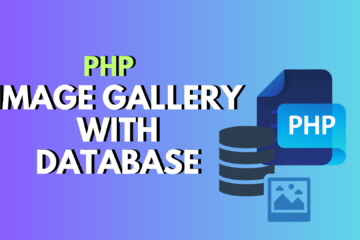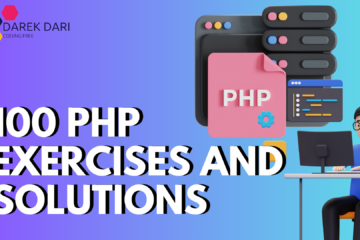
Table of Contents
So, you’re diving into the realm of Content Management Systems (CMS), huh?
PHP Projects:
- Quiz Application in PHP
- PHP Image Gallery Project Source Code
- Best 200 Questions Game in PHP
- Bulletin Board PHP Project
- Content Management System (CMS) PhP Project
- Event Management System Project in PHP
- Personal Blog with PHP
- Chatbot in PHP
- URL Shortenee in php
Welcome, fellow adventurer, to the exciting realm of Content Management Systems (CMS) PHP projects! Picture this: a digital odyssey where creativity knows no bounds, and the possibilities are as vast as the virtual horizon.
Whether you’re a seasoned developer navigating the ever-evolving landscape of web technologies or a curious explorer setting foot in uncharted territory, join us as we embark on a journey to unravel the mysteries of CMS development using the power of PHP. 🚀
Buckle up because we’re about to take you on a wild ride through the fascinating world of PHP projects and CMS development. 🎢
Understand the Content Management Systems (CMS)
What is a Content Management Systems CMS? 🐝
Content Management Systems, or CMS for short, are like the superheroes of the web development world. They swoop in to save the day, making it super easy to create, manage, and update content on websites without breaking a sweat.
Whether you’re a tech whiz or a coding newbie, CMS platforms provide a user-friendly interface that empowers you to take charge of your digital content like a boss.
Why PHP Projects Rock the CMS Scene 🤘
Now, you might be wondering, “Why PHP, though?” Well, my friend, PHP (Hypertext Preprocessor) is the ultimate wingman for CMS development. Its versatility, robustness, and massive community support make it the go-to language for building dynamic and interactive websites.
Plus, PHP plays exceptionally well with databases like MySQL, paving the way for seamless content management and data handling. So, if you’re looking to whip up a killer CMS project, PHP is your trusty sidekick.
Breaking Down the Anatomy of a CMS 🧩
Picture this: Your CMS project is like a well-oiled machine with different moving parts working in harmony to deliver a stellar user experience. Let’s take a peek under the hood and see what makes it tick.
photo gallery php
php exercises
php exercises and solutions
php exercises and solutions pdf
php exercises online
php lab exercises
php mvc framework from scratch
php mvc from scratch
CMS PHP Project Source Code 🛠️
The Project Structure 🏗️
Before we dive into the nitty-gritty of coding, let’s lay down the groundwork for our PHP CMS project. Here’s a sneak peek at the directory structure:
project/
├── css/
│ └── style.css
├── includes/
│ ├── config.php
│ └── functions.php
├── js/
│ └── script.js
├── pages/
│ ├── article.php
│ ├── edit_article.php
│ ├── home.php
│ └── new_article.php
├── templates/
│ ├── footer.php
│ ├── header.php
│ └── navigation.php
├── uploads/
├── .htaccess
└── index.phpindex.php 📜
Here’s where the magic begins! index.php serves as the gateway to your CMS, showcasing the latest articles in all their glory. With PHP wizardry, we fetch articles from the database and display them like dazzling gems on a virtual stage. Who knew content management could be this glamorous?
<?php
include_once('includes/config.php');
// Fetch articles from the database
$query = "SELECT * FROM articles ORDER BY created_at DESC";
$result = mysqli_query($conn, $query);
// Display articles
include('templates/header.php');
?>
<div class="container">
<h2>Latest Articles</h2>
<ul>
<?php while ($row = mysqli_fetch_assoc($result)) : ?>
<li>
<h3><?php echo $row['title']; ?></h3>
<p><?php echo substr($row['content'], 0, 100) . '...'; ?></p>
<a href="pages/article.php?id=<?php echo $row['id']; ?>">Read more</a>
</li>
<?php endwhile; ?>
</ul>
</div>
<?php include('templates/footer.php'); ?>
new_article.php 🆕
Ah, the thrill of creation! new_article.php lets you channel your inner wordsmith and craft captivating articles with ease. Armed with a form and a sprinkle of PHP sorcery, you can unleash your creativity and bring your ideas to life. Say goodbye to writer’s block and hello to a world of endless possibilities!
<?php
include_once('../includes/config.php');
if ($_SERVER['REQUEST_METHOD'] == 'POST') {
$title = $_POST['title'];
$content = $_POST['content'];
// Insert the new article into the database
$query = "INSERT INTO articles (title, content) VALUES ('$title', '$content')";
mysqli_query($conn, $query);
header('Location: ../index.php');
exit;
}
include('../templates/header.php');
?>
<div class="container">
<h2>Create New Article</h2>
<form method="post" action="">
<label>Title:</label><br>
<input type="text" name="title" required><br>
<label>Content:</label><br>
<textarea name="content" rows="5" required></textarea><br>
<input type="submit" value="Submit">
</form>
</div>
<?php include('../templates/footer.php'); ?>
article.php 🌊
Ever wondered what happens when you click on an intriguing article? Wonder no more! article.php whisks you away on a journey through the depths of captivating content.
With a simple URL parameter, you’re transported to the realm of the chosen article, where words weave tales that captivate the soul.
<?php
include_once('../includes/config.php');
$id = $_GET['id'];
// Fetch article from the database
$query = "SELECT * FROM articles WHERE id = $id";
$result = mysqli_query($conn, $query);
$row = mysqli_fetch_assoc($result);
include('../templates/header.php');
?>
<div class="container">
<h2><?php echo $row['title']; ?></h2>
<p><?php echo $row['content']; ?></p>
</div>
<?php include('../templates/footer.php'); ?>
templates/header.php and templates/footer.php 🧱
No CMS project is complete without its trusty sidekicks: header.php and footer.php. Together, they form the backbone of your website, providing structure, style, and a touch of personality. With HTML and PHP dancing in perfect harmony, these templates ensure a seamless user experience from start to finish.
<!DOCTYPE html>
<html lang="en">
<head>
<meta charset="UTF-8">
<meta name="viewport" content="width=device-width, initial-scale=1.0">
<title>CMS</title>
<link rel="stylesheet" href="../css/style.css">
</head>
<body>
<header>
<h1>CMS</h1>
</header>
<nav>
<ul>
<li><a href="../index.php">Home</a></li>
<li><a href="new_article.php">New Article</a></li>
</ul>
</nav>
<main>
templates/footer.php
</main>
<footer>
<p>© <?php echo date("Y"); ?> CMS</p>
</footer>
</body>
</html>There you have it, folks! A glimpse into the wonderful world of Content Management Systems (CMS) using PHP. It’s like riding a unicorn through a rainbow-filled sky. So, grab your PHP wizard hat and start crafting your own CMS masterpiece today! 🚀
Exploring the Features of Content Management System (CMS)
CMS Plugins and Themes 🌈
Plugins: Your Website’s Best Friends
Imagine your website as a cozy little house. Now, what if I told you that you could add extra rooms, secret passages, and even a slide from the attic to the basement without lifting a hammer? That’s the magic of plugins! These nifty little add-ons supercharge your CMS, giving it new powers and functionalities.
Need a contact form? There’s a plugin for that. Want to spice up your site with social media integration? You betcha, there’s a plugin for that too! With plugins, the possibilities are endless, and your website can evolve and adapt to your needs like a chameleon changing its colors.
Themes: Dress Your Website to Impress
Just like picking out the perfect outfit for a special occasion, choosing the right theme for your website is crucial. Themes dictate the overall look and feel of your site, setting the tone for your online presence. Whether you’re going for sleek and modern, cozy and rustic, or bold and flashy, there’s a theme out there that’ll suit your style like a glove.
And the best part? Most CMS platforms offer a vast library of themes to choose from, so you can mix and match until you find the one that speaks to your soul. So go ahead, dress your website to impress, and watch as it turns heads and steals the spotlight!
Admins, Editors, and Contributors, Oh My!
In the bustling kingdom of content creation, not all users are created equal. That’s where user roles and permissions come into play. Imagine your website as a bustling metropolis, with different inhabitants playing different roles. You’ve got the all-powerful admins, who rule with an iron fist and have access to every nook and cranny of your CMS kingdom.
Then there are the trusty editors, who wield their pens (or keyboards) with finesse, shaping and refining the content for maximum impact. And let’s not forget the humble contributors, the unsung heroes who provide the lifeblood of your website with their valuable contributions. By assigning specific roles and permissions to each user, you can ensure that your CMS operates smoothly and securely, like a well-oiled machine.
Introducing a PHP-based CMS Project
Building Blocks of Your PHP CMS Project
Alright, now let’s roll up our sleeves and get down to business. Here’s a breakdown of the key components of your PHP-based CMS project:
project/
├── css/
│ └── style.css
├── includes/
│ ├── config.php
│ └── functions.php
├── js/
│ └── script.js
├── pages/
│ ├── article.php
│ ├── edit_article.php
│ ├── home.php
│ └── new_article.php
├── templates/
│ ├── footer.php
│ ├── header.php
│ └── navigation.php
├── uploads/
├── .htaccess
└── index.phpManaging Users with Finesse
Now, let’s take a closer look at how you can implement user roles and permissions in your PHP-based CMS project. But first, let’s set the stage with a visual aid:
| User Role | Permissions |
|---|---|
| Admin | – Create, edit, and delete articles <br> – Manage users and their roles <br> – Access to all areas of the CMS |
| Editor | – Create, edit, and delete articles <br> – Moderate user-generated content |
| Contributor | – Create and edit their own articles <br> – Submit articles for review by editors |
php mvc project source code
php photo database
php photo gallery
php project source code
php projects source code
php projects with source code
php real time application
php real time chat application
php realtime chat
Anatomy of Your PHP CMS Codebase
In the enchanted land of PHP CMS, your codebase is your trusty steed, carrying you through the vast expanse of the digital realm. Let’s take a closer look at some of the main files that make up your PHP CMS project:
- index.php: This is the gateway to your kingdom, where visitors can marvel at the wonders of your content. It fetches articles from the database and displays them in all their glory.
- new_article.php: Ever wanted to be a published author? Well, now’s your chance! This page lets you create and submit new articles to populate your website with fresh content.
- article.php: Dive deeper into the rabbit hole and explore individual articles with this page. It retrieves a specific article from the database and presents it to eager readers.
- templates/header.php: Every good king needs a crown, and every good website needs a header. This file contains the HTML markup for the header section of your site, including the title and navigation menu.
- templates/footer.php: Last but not least, we have the footer, the unsung hero of every web page. This file houses the footer section of your site, complete with copyright information and a heartfelt farewell.
With these pieces in place, you’re well on your way to creating a dynamic and engaging website powered by PHP and fueled by your creativity. So saddle up, brave adventurer, and embark on your quest to conquer the digital frontier! 🏰🚀
Conclusion
And there you have it, folks! Your ticket to the thrilling world of Content Management Systems (CMS) PHP projects 🌟
With a dash of creativity, a sprinkle of PHP magic, and a whole lot of passion, you’re ready to embark on an epic journey of digital storytelling. So, roll up your sleeves, fire up that code editor, and let the CMS adventure begin! 🚀
PHP projects offer endless possibilities for developers of all skill levels. Whether you’re a beginner looking to dip your toes into web development or an experienced developer seeking new challenges, PHP projects provide a rich and rewarding journey filled with opportunities to learn, grow, and create impactful solutions.
As we conclude our whirlwind tour of PHP projects, remember that the adventure doesn’t end here. With PHP as your trusty companion, the possibilities are endless, and the journey ahead is filled with excitement, discovery, and endless opportunities to unleash your creativity. So, what are you waiting for? Dive in, explore, and embark on your own PHP adventure today! 🚀✨
Embarking on Exciting PHP Adventures
Alright, buckle up, folks! We’ve explored the thrilling world of Content Management Systems (CMS) with PHP, but guess what? There’s a whole galaxy of PHP projects out there just waiting for us to discover! So, grab your explorer’s hat and let’s dive into some fascinating PHP projects beyond the CMS realm.
Discovering Diverse PHP Wonders
E-commerce Platforms: Your Online Marketplace
Imagine strolling through a bustling marketplace, but this time, it’s all online! With PHP, you can bring that vibrant shopping experience to life with your very own E-commerce platform.
Whether you’re dreaming of launching your online store or expanding your digital empire, PHP-powered E-commerce platforms offer a flexible and customizable solution to showcase your products and connect with customers worldwide.
Social Networking Sites: Connecting Friends, One Click at a Time
Ah, the magic of social networking sites, where friends connect, conversations flow, and memes reign supreme. With PHP, you can create your own digital hangout spot! From profile pages to news feeds, messaging systems, and friend requests, PHP provides the tools to craft a dynamic and engaging social platform where users can share, connect, and interact in real-time.
Online Learning Platforms: Opening Doors to Knowledge
Education is the key to unlocking endless possibilities, and with PHP, you can open the doors to knowledge with your very own online learning platform.
Whether you’re passionate about teaching or fostering a community of lifelong learners, PHP-powered online learning platforms offer a flexible and accessible way to deliver courses, share resources, and facilitate discussions. So, dust off your virtual chalkboard and get ready to inspire minds and ignite imaginations!
Embracing the Beauty of PHP Projects
Now that we’ve glimpsed into the diverse landscape of PHP projects, let’s take a moment to appreciate the beauty and versatility of this powerful scripting language.
Whether you’re building a CMS, E-commerce platform, social networking site, or online learning platform, PHP empowers you to bring your ideas to life and create meaningful experiences for users worldwide.
Frequently Asked Questions (FAQ) About PHP Projects
Got burning questions about PHP projects? Don’t worry, we’ve got you covered! Here are some common queries answered just for you:
What are PHP projects, and why are they popular?
PHP projects are web applications or software developed using the PHP programming language. PHP is a widely-used open-source scripting language that is especially suited for web development and can be embedded into HTML. PHP projects are popular because PHP is easy to learn, flexible, and has a vast community of developers contributing to its ecosystem.
What types of projects can be built with PHP?
The versatility of PHP allows developers to build a wide range of projects, including but not limited to:
- Content Management Systems (CMS)
- E-commerce platforms
- Social networking sites
- Online learning platforms
- Blogs and forums
- Customer Relationship Management (CRM) systems
- Web applications and APIs
How do I get started with PHP projects?
Getting started with PHP projects is easier than you think! Here’s a simple roadmap to get you going:
- Learn the basics: Familiarize yourself with PHP syntax, variables, data types, and control structures.
- Set up your development environment: Install a local server environment like XAMPP or WAMP to run PHP scripts on your computer.
- Build small projects: Start with small projects like a simple website or a to-do list to practice your skills.
- Explore frameworks and libraries: Dive into popular PHP frameworks like Laravel, Symfony, or CodeIgniter to streamline your development process.
- Join the community: Engage with other PHP developers through forums, meetups, and online communities to learn from their experiences and get support when needed.
Are PHP projects suitable for beginners?
Absolutely! PHP is known for its simplicity and ease of use, making it an excellent choice for beginners who are just getting started with web development. With a plethora of tutorials, documentation, and resources available online, beginners can quickly grasp the basics of PHP and start building projects in no time.
How can I enhance my PHP project skills?
To enhance your PHP project skills, consider the following tips:
- Practice regularly: The more you code, the better you’ll become. Challenge yourself with new projects and concepts.
- Stay updated: Keep abreast of the latest trends and updates in PHP development by reading blogs, following industry experts, and attending webinars or workshops.
- Contribute to open-source projects: Joining open-source projects on platforms like GitHub allows you to collaborate with other developers and gain valuable experience.
- Seek feedback: Don’t be afraid to ask for feedback on your projects from peers or mentors. Constructive criticism can help you identify areas for improvement and grow as a developer.




4 Comments
Creating Best PHP MVC Framework From Scratch 2025 · July 20, 2024 at 3:24 pm
[…] Content Management System (CMS) PhP Project […]
Best Booking System In PHP With Source Code 2024 · October 9, 2024 at 7:53 pm
[…] Content Management System (CMS) PhP Project […]
Best Social Networking Platform With PHP And React.js 2024 · October 24, 2024 at 10:19 am
[…] Content Management System (CMS) PhP Project […]
Build Best Simple Blog Application With PHP 2024 · October 24, 2024 at 10:19 am
[…] Content Management System (CMS) PhP Project […]